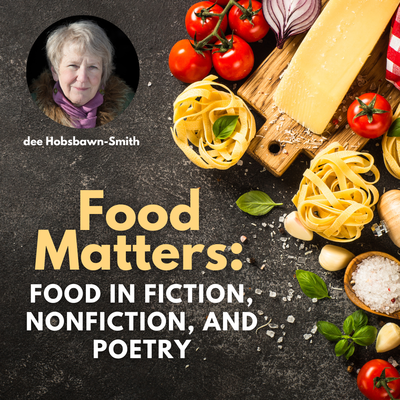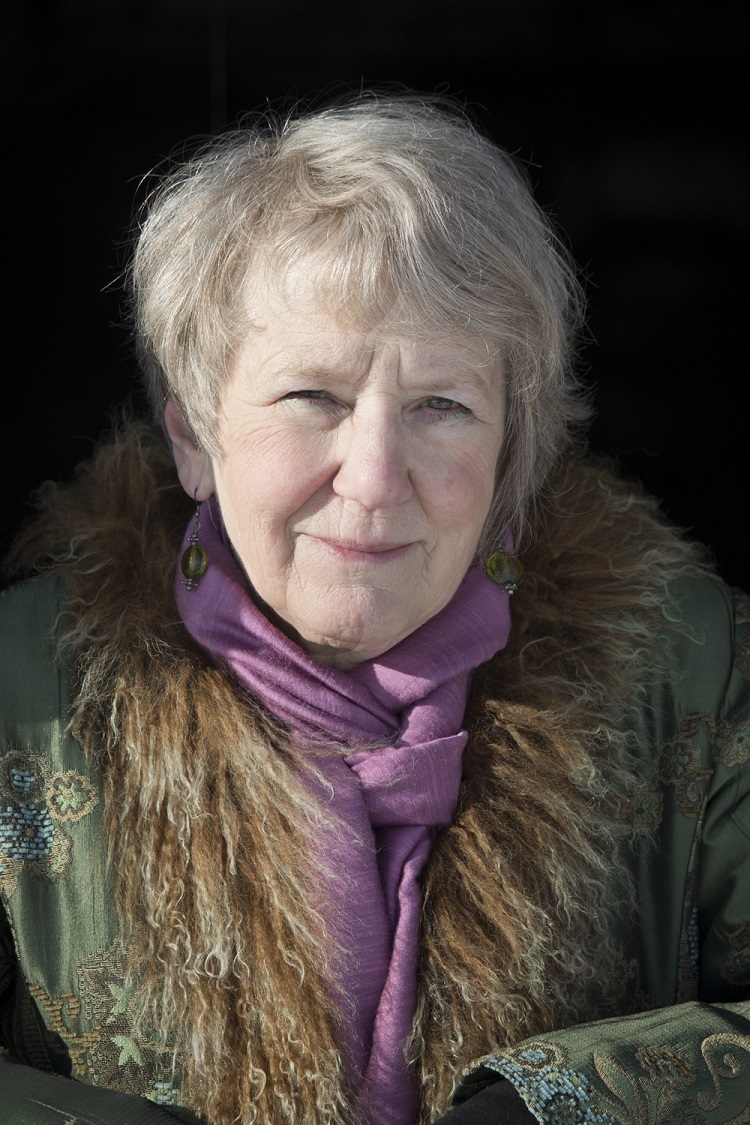- Home
- About SWG
- Become a Member
- SWG Foundation
- Find Saskatchewan Writers
- Programs & Services
- Events & Workshops
- Retreats
- Resources

Please note all times listed are Saskatchewan time. Find your time zone here: https://dateful.com/time-zone-converter
If this workshop is sold out, please email swgevents@skwriter.com to be placed on the waitlist.
This workshop will not be recorded.
Accessibility:
This workshop will be on the ground floor of The Admin Centre for Sport, Culture, & Rec in Saskatoon, and is wheelchair accessible.
Food Matters: Food in Fiction, Nonfiction, and Poetry
Food is one of our most basic needs, something we require on a daily basis. This can render it practically invisible, so normal an occurrence as to appear unimportant, in life and in literature. But food matters in novels, stories, poetry, and nonfiction, just as surely as it does in life. Writers such as Virginia Woolf, Amy Tan, Nora Ephron, T.C. Boyle, Evelyn Waugh, Margaret Atwood, Lorna Crozier, Maya Angelou, Seamus Heaney, and many others (none of whom claim to be “food writers”) in many eras and genres have found ways to utilize food in their literature in ways that are vital and engaging.
Food can contribute many things on the page. Consider a food’s visceral characteristics – colour, flavour, texture, sounds, shapes, smell, mouthfeel – and how those can be brought to bear in writing to season the text.
But beyond adding description, a specific food can serve many roles – metaphor, theme, symbol, weapon, tool, background, context, fuel, setting, undercurrent, subtext, backstory, as well as its more expected emotional weight in memory and interpersonal relationships. And of course, food can be sexualized.
Including food can add vital information and shape to the written work: food can be politicized, business-savvy, addressing point of view issues, and issues related to race, class, gender, poverty and wealth, the profit motive, climate change, work, tourism, travel, consumerism, capitalism, exploitation, child labour, health, wellness, age, exercise – the list is long, and growing longer.
This workshop will explore each writer’s relationship to a particular food or food memory, then use visualization, writing exercises, readings, and discussion to explore transformational approaches that will help each writer reconsider how they can make food matter in their own writing.
This 5-hour in-person workshop includes critique and discussion of optional previously submitted work by each participant, with on-site revision as time allows.
Note regarding pre-session homework:
Submission details will be shared with participants upon registration.
 dee Hobsbawn-Smith’s award-winning writing is often influenced by her history as a chef, restaurateur, and Slow Food activist. Her poetry, essays, fiction, food writing, and journalism have appeared in Canadian, American, and Scottish anthologies, literary journals, websites, newspapers, and magazines. She earned her MFA in Writing and MA in English at the University of Saskatchewan. Bread & Water: Essays, her eighth book, is published by the University of Regina Press and is shortlisted for two Sask Book Awards. Her debut novel, Danceland Diary, will be published by Radiant Press in Fall 2022. Foodshed: An Edible Alberta Alphabet, won three international awards for its portrayal of small-scale sustainable food production and issues.
dee Hobsbawn-Smith’s award-winning writing is often influenced by her history as a chef, restaurateur, and Slow Food activist. Her poetry, essays, fiction, food writing, and journalism have appeared in Canadian, American, and Scottish anthologies, literary journals, websites, newspapers, and magazines. She earned her MFA in Writing and MA in English at the University of Saskatchewan. Bread & Water: Essays, her eighth book, is published by the University of Regina Press and is shortlisted for two Sask Book Awards. Her debut novel, Danceland Diary, will be published by Radiant Press in Fall 2022. Foodshed: An Edible Alberta Alphabet, won three international awards for its portrayal of small-scale sustainable food production and issues.
Funding provided by:
![]()
![]()
![]()
In proud partnership with:
![]()